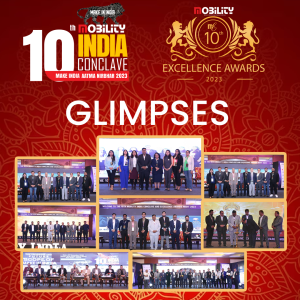Union Finance Minister Nirmala Sitharaman presented her sixth Budget on February 1. This was an interim budget ahead of the general elections later this year. The Interim Budget 2024 was focused on youth and women empowerment, while maintaining fiscal consolidation and continuing capex.
Mobility Magazine has spoken to the industry veterans who shared their insights on the opportunities for India at the global level and how the nation is expanding to a more contusive ecosystem.

2024 being the election year, the budget was always going to be interim budget and provides for a guidance on the national policies and also sectorial guidance. With much impetus on domestic manufacturing, we are strongly back the vision of Skill India, creating trained manpower for higher employability at the industry. This also further bolster the talent pool as we strengthen the country on back of robust R&D. In short available tenure of the interim, the budget seems well guided.

The interim budget in my opinion touched upon the right chords with a focus on innovation, youth and entrepreneurship. The mantra of Governance, Development and Performance is only a boost for a sector like ours which is constantly growing and looking for the government’s support to compete at the global level. A corpus of INR 1 Lakh crore with 50-year interest free loans will enable generation of more opportunities for the early stage entrepreneurs and help in scaling private sector growth. On the other hand, the Hon’ble Finance Minister’s concentration on the training of the Micro, Small and Medium enterprises and the impetus on making the regulatory environment growth-centric is a positive step towards building an Atmanirbhar Bharat.
We are also pleased to observe that the country is observing continued FDI inflow over the year, which represents a significant turning point for the nation’s entrepreneurial landscape. We are positive that the government will continue with their efforts of creating a seamless ecosystem for further push of foreign capital investment. In addition, the accomplishment of the PM Mudra Yojana, which has authorized 43 crore loans totalling INR 22.5 lakh crore for our youth’s entrepreneurial dreams, along with initiatives like Fund of Funds, Start Up India, and Start Up Credit Guarantee schemes, will significantly contribute to our Hon’ble Prime Minister’s goal of seeing start-ups turn into “Rozgardata”. Last but not least, encouraging women’s entrepreneurship is essential for our industry as an inclusive business ecosystem, and the thirty crore Mudra Yojana loans to women entrepreneurs thus far are a great step in this direction.

The Interim Union Budget 2024 presented by FM Nirmala Sitharaman reflects the Government’s undeterred focus on inclusive growth. The focus on boosting employability through training and skill development, along with the significant support to foster the entrepreneurial spirit of Indian youth through 43 crore loans amounting to Rs. 22.5 lakh Crore, is indeed a commendable step towards pushing India’s growth at the global stage. These reforms encourage us to work towards India’s vision to become a developed nation by 2047 through enhanced capability and empowerment.
Being a homegrown brand, we believe that the initiatives like PM Mudra Yojana & Start Up India will play a crucial role in catalysing the growth of the startup ecosystem in India and eventually further strengthen the ‘Make in India’ efforts. We appreciate the economic policies adopted to foster growth, improve productivity, increase opportunity, and fulfill aspirations through strategic technological advancements. Driven by the vision of Vikasit and Aatmanirbhar Bharat, we look forward to actively participating in the nation’s journey towards global prominence and innovation leadership

“This budget has truly laid the foundation for the next 5 years with several important aspects taken into consideration. GoI’s plan to build 2 Cr houses under PM Awas Yojna Gramin will surely give a boost to the consumer durables industry in the country and enable the people to live in their own house. This will be assisted by rooftop solarisation for electricity. Additionally, larger availability of credit for the private sector will surely help the companies to upscale their operations in the country. We were surely expecting a change in the income tax slabs to support the middle-class population which happens to be the highest taxpayer class in the country but that has surely not happened. Additionally, a reduction in GST on LED TVs above the sizes of 32 inches from 28% to 18% was expected which didn’t happen.”
Mr. Sanjeev Bhardwaj, Founder & CMD, ERD Technologies

We feel that the Budget 2024 is very good and quite appealing and will definitely propel the growth for the mobile accessory sector. Concurrently, prioritizing R&D and skill development is non-negotiable, as it shapes a comprehensive budget that charts the course for sustained growth and innovation.

“The decision of Ministry of Finance to reduce import duties on smartphone components and spare parts is a remarkable move. This strategic move aligns with the industry’s collective request to rationalize duty structures, transitioning from 15% to 10%, thereby fostering enhanced competitiveness for the Indian smartphone sector on both domestic and international fronts. This favourable development will serve as a significant catalyst for smartphone manufacturing entities, TECNO included, deeply committed to the principles of ‘Make-in-India.’ TECNO is steadfast in its commitment to fostering industry growth through the augmentation of manufacturing and supply chain operations within India.

We appreciate the Government of India’s commitment to fostering unprecedented growth through MSME training initiatives and impactful GST reforms in the Interim Budget 2024, realizing ‘One Nation, One Market, One Tax.’ The focus on upskilling youth aligns with our dedication to empower them though our latest manufacturing facility in Andhra Pradesh. However, for sectoral growth and universal Smart TV accessibility, re-evaluating the 28% tax on Smart TVs above 43 inches is crucial. Recognizing these devices as essential household appliances, not luxuries, lowering taxes can boost sales and contribute to the nation’s economic prosperity.
We are optimistic that these measures will reduce compliance burdens and logistics costs, fostering an environment conducive to innovation and economic progress. Aligned with the government’s vision for industrial development, we anticipate a positive ripple effect across sectors, benefiting industries and companies.”

The facilitation of a 34-crore loan for women entrepreneurs, along with the 43% female enrolment in STEM courses and the allocation of 1/3 seats in government, reflect a commitment to equal representation. Women setting up their own businesses will lead to job creation for the same gender, and recent studies have shown that empowering women economically leads to increased GDP and poverty reduction, benefiting families and communities. Overcoming various challenges and barriers as a woman entrepreneur in India is not an easy feat, and with encouragement from the government, this will provide a boost, especially to those from economically weaker backgrounds. Increased women’s entrepreneurship is also a step towards global collaboration and will provide India with an additional platform to expand networks and access global markets.”

The government’s focus on empowering the MSME sector is evident. The commitment to providing timely and adequate finances, relevant technologies, and training is welcomed. The emphasis on orienting the regulatory environment to facilitate MSME growth indicates a supportive policy framework. The increased threshold for presumptive taxation from ₹2 crore to ₹3 crore is seen as a positive step, providing relief to small retail businesses, allowing them to focus on growth and development. Mr. Mandeep anticipates that these measures will enhance the competitiveness of MSMEs on a global scale. In alignment with the ‘Panchamrit’ goals, the founder notes the government’s focus on sustaining high and resource-efficient economic growth. The commitment to energy security is perceived as a positive step, ensuring availability, accessibility, and affordability for businesses. To meet investment needs, the founder appreciates the government’s commitment to preparing the financial sector in terms of size, capacity, skills, and regulatory framework. This will contribute to a robust financial ecosystem that can support the growth aspirations of both MSMEs and retail businesses.

The Union Budget 2024 demonstrates a continued focus on the tech landscape, emphasizing inclusive growth across various sectors such as agriculture, finance, health, and diverse communities that empowers the economy across all sectors. The Skill India mission has resulted in robust training, re-skilling and upskilling of the youth which underscores the goals to enhance ‘Atma Nirbhar India’ thereby the proclivity towards more local manufacturing, Research & Development will eventually make India a true leader in manufacturing at a global scale. The comprehensive approach towards channelising efforts into the Start-up community, women entrepreneurs, provision of fundamental needs to the nook & corner of the country is the face of an upward trajectory. We wish to see more scalable changes in the coming years into the tax regimes where the maximum benefits would be reaped by our country’s young gen.”

As technology continues its rapid advancement, the 2024 interim budget emerges as a catalyst, steering the mobile accessory, including the robust geospatial sector, towards sustainable excellence and global competitiveness. The Union Budget should accelerate electronic manufacturing and drive widespread tech adoption to position India as a global powerhouse in tech manufacturing and AI-led advancements.

The interim Budget 2024 has outlined the focus areas of the government as India moves ahead to become a US$ 7 trillion economy by 2030. Infrastructure development plans mentioned in the budget like development of aspirational districts and blocks, including generation of ample economic opportunities augurs well for enterprises like us with a strong focus on smaller cities and towns. The Finance Minister, Nirmala Sitharaman during her speech said for the tech-savvy youth, this will be a golden era. She announced that a corpus of Rs 1 lakh crore will be established with 50-year interest-free loan provided. The corpus will provide long-term financing or refinancing with long tenors and low or nil interest rates. This will help new technology start-up to enter the industry and bring their innovation to the table. The government has reiterated to give priority to Micro, Small and Medium
Enterprises (MSME) in its policies, helping the segment to grow and also compete globally. Overall, being an interim budget, the government used the opportunity to highlight its economic vision for the country and industries.

The Interim Budget presented by the Finance Minister today reemphasized the government’s economic policies and the commitment to sustained growth, improving productivity and creating opportunities with a focus on skilling and reskilling. In a significant gain for the telecom sector just before the interim budget, the current customs duty exemption granted to vessels engaged in laying submarine cables in India – which lapses on 31st March 2024 – was extended up to 30th September 2024. Telecom companies depend heavily on submarine cables for the high-speed transfer of data around the globe and this step will help in following the compliances.
The announcement of a corpus of ₹1 lakh crore for the technology sector is a positive measure as access to capital is a critical factor to support innovation and growth. The long-term, interest-free or low interest rate loans and focus on deep tech will further encourage the private sector to scale up research and innovation.
We are hopeful that in the post-election full budget, the industry’s suggestions to reduce regulatory levies like License Fee, deferring USOF contribution till the existing funds are exhausted, exemption of Basic Customs Duty (BCD) on Telecom equipment, waiving of GST on regulatory payments and refund of ITC, among others, will be considered and addressed by the Government during the course of the year.”

BMT Electrinno Topology Technologies
The focus on innovation and the support for startups through various schemes, keen focus on supporting MSMEs with enhanced credit access and infrastructure development is commendable. We strongly believe that this will help the upcoming manufacturers and catalyse into a transformative era for entrepreneurial ventures.

“With the interim budget promoting the India-Middle East corridor, there will be a boom in infrastructure. This initiative will enhance the business prospects of exporting goods to the Middle East and Europe 40% faster. It will not only connect India with commercial hubs but also make the nation stand out. ‘Made in India’ goods will become the next sought-after market. India will no longer be just the tech backend; instead, this initiative will increase the entrepreneurial drive of the nation, making it a product-oriented country. Made In India consumer durables are set to conquer the global market, creating exciting new possibilities for widespread recognition and success.
Speaking of entrepreneurship, the challenges faced by startups in raising investments are evident, with Indian startups experiencing a significant drop in funding over the past year. However, this initiative is poised to boost foreign investment in India.”

The increase in production-linked incentives will greatly benefit the home-grown manufacturing and allied industry. It will provide a greater push to the Make in India initiative.
I am hopeful this will make domestic electronics and component manufacturing more robust and innovative, reducing our dependency on China. I would love to add completely Made in India smartwatches, speakers and other gadgets to my product portfolio that would be entirely conceptualised and produced in my INDIA.

The recent budget announcement has sparked a renewed sense of optimism, presenting vast opportunities in manufacturing. Emphasizing growth and resilience, especially in the face of global challenges and the ‘Make in India’ initiative, the budget is anticipated to provide relief for businesses via lower interest rates and reduced government borrowing. Looking ahead, Brandworks envisions tailored funding and tax incentives for the electronics sector, with a focus on semiconductors and assembly. With the Indian economy poised for 7%+ growth, the ESDM sector is set to play a significant role. As the industry stays tuned for potential measures impacting manufacturing, the global landscape is evolving very fast.

It is an overall positive Union budget for our country, where fiscal prudence meets visionary aspirations. The reduction in fiscal deficit from 6.4% to 5.9% lays stable groundwork, while the substantial capital expenditure of Rs 10 lakh crore amplifies the government’s commitment to infrastructure and innovation, leading to growth. The ambitious goal of achieving an 11% nominal GDP growth seems to set the stage for a dynamic economic landscape, particularly benefiting the consumer electronics, manufacturing, and technology sectors. The liberation of 25 crore individuals from multi-dimensional poverty aligns with a forward-thinking approach for the country overall, creating an inclusive consumer base that fuels demand for cutting-edge technology. Budget 2024 ushers in a golden era for the tech-savvy youth, with a Rs 1 lakh crore corpus offering a 50-year interest-free loan, catalysing innovation and long-term financing. The ‘First, Develop India’ spirit in FDI inflows and the positive impact of GST on industry compliance further position the technology sector for sustained growth, innovation, and global competitiveness. I express my gratitude to the Hon’ble Finance Minister for the strategic reduction in imports duties, implemented days before the budget announcement for the mobile manufacturing sector. These duty cuts are bound to enhance the competitiveness for Indian Mobile manufacturers, in both domestic and export markets, rejuvenating the market sentiment. A significant boost is expected in the Consumer Electronics industry with the creation of 20 million households through the rural housing scheme, reviving demand for products like LED TVs, washing machines and refrigerators.
- Mr. Paresh Vij, Founder, U&i

The budget 2024 is quite appealing and we feel that the Skill India mission will really help in improving the robust training, re-skilling and upskilling of the youth which underscores the goals to enhance ‘Atma Nirbhar India.

This forward-looking budget not only fuels the growth of the IT sector but also actively supports a comprehensive skills development ecosystem, ensuring the creation of a workforce that is geared for the future.

I feel that overall, the founder’s positive sentiment reflects a belief in the budget’s potential to foster growth and innovation across MSMEs and retail businesses.

Haier India applauds the visionary approach of the interim FY25 budget announced by the Honourable Finance Minister today, particularly its focus on technology and innovation. These align perfectly with our commitment to advancing technology and delivering high-quality appliances. The new housing scheme for the middle class and initiatives to help slum dwellers as well as those living on rent is a welcomed move along with the 2 crore additional houses under the Pradhan Mantri Awas Yojna – Gramin in 5 years. The emphasis on upskilling the youth and creating a conducive ecosystem for business expansion is truly commendable and we are optimistic that this move will aid the industry’s overall growth. Moreover, the heightened focus on manufacturing and infrastructure is anticipated to have a favourable effect on our developmental trajectory. This year’s budget’s attention to people, research & development, innovation, and corporate taxation bodes well for the consumer durables sector. As we journey towards a ‘Viksit Bharat’ by 2047, Haier India remains steadfast in its commitment to ‘Make in India, Made for India’, and helping the country move towards its trillion-dollar economy goal.

“The Interim Budget is forward-looking and represents the remarkable evolution of India’s mobile and telecom landscape in the last decade, standing true to our expectations. The allocation towards the development of electronics manufacturing clusters unlocks the accessibility of high-quality technology for varied consumers, including those at the bottom of the pyramid. Additionally, the proposal to further provide relief in customs duty on the import of battery covers, main lenses, back covers, and mechanical items will boost the Make in India initiation and solidify the mobile manufacturing ecosystem in the country. This reduction, coupled with the establishment of a one-lakh-crore corpus supported by a fifty-year interest-free loan, will empower the private sector to significantly advance research and innovation in sunrise domains. Despite the industry’s growth, there is substantial room for expansion in India, and we are optimistic that supportive government policies, infrastructure investments, and a vibrant innovation ecosystem will unleash the next wave of digital transformation.”

In the unveiling of the Interim Union Budget 2024, Finance Minister Nirmala Sitharaman has strategically charted out a path not just for driving economic growth, but for a transformative era of inclusive prosperity.
The strategic emphasis on empowering entrepreneurship with robust financial support is a game-changer. It paves the way for innovation-led development, mirroring our own ambition to be at the forefront of ‘Viksit Bharat’, and resonates deeply with our vision of building successful technology businesses out of India.
This budget is not just a financial statement; it’s a blueprint for a resilient and self-reliant India, capturing the spirit of ‘Sabka Prayas’ and our collective resilience through challenging times.
As we at Hero Electronix (Qubo) stay buoyed by the government’s sustained support, we are more committed than ever to be instrumental in India’s journey. It’s a journey not just towards economic success, but towards establishing India as a beacon of innovation and visionary leadership on the world stage.”

The recent budget announcement has invigorated the founder with a renewed sense of optimism. The decision to increase the presumptive taxation threshold from ₹2 crore to ₹3 crore is perceived as a welcome relief for small retail enterprises, offering them room for growth. The founder applauds the government’s commitment to fostering an environment conducive to development and productivity, evident in the forward-looking ‘Reform, Perform, and Transform’ approach.
The establishment of a substantial corpus with a fifty-year interest-free loan specifically tailored for the tech-savvy youth is hailed as a catalyst for innovation and entrepreneurship. This visionary move is expected to usher in a golden era of technological advancements. The founder is particularly appreciative of the strategic emphasis on strengthening defense technologies, aligning with the goal of self-reliance.
In the realm of MSMEs, the founder commends the government’s focus on providing timely finances, relevant technologies, and training, foreseeing increased competitiveness on a global scale. Overall, the founder’s positive sentiment reflects a belief in the budget’s potential to foster growth and innovation across MSMEs and retail businesses.

We are very pleased to find that renewable energy has been a focus area for government spending in the Interim Budget. The comprehensive plan aimed at achieving the nation’s ambitious Net Zero target by 2070 in the Interim Budget 2024 is encouraging and will steer the country towards a greener future. The honourable Finance Minister’s push for rooftop solar by providing assistance for the installation of rooftop solar systems for 1 crore households under the Pradhan Mantri Suryodaya Yojana will spur demand in the industry, and more and more people will be encouraged to opt for renewable energy.

We are optimistic about measures like the concerted focus of the honourable Finance Minister on promoting electric mobility through the announcement of greater adoption of e-buses, which is truly encouraging for the EV industry and will equally support sustainable transportation solutions. However, there are certain areas where we believe the budget could have been more encouraging. For instance, a more robust policy framework for the adoption of electric vehicles (EVs) and announcements on the related infrastructure development would have been more beneficial for the industry. Additionally, greater incentives for EV manufacturing and research and development (R&D) activities would have further accelerated the growth of the EV industry.

Aatmanirbharta and Viksit Bharat took centre stage in the budget, epitomizing a visionary approach to India’s self-reliance and comprehensive development. The vision for an economically independent and developed India permeated every facet of the budget, showcasing a steadfast commitment to innovation, resilience, and transformative growth, positioning India as a global leader. As a leading EV charger manufacturer, we applaud the strategic focus on the EV sector. The emphasis on creating business opportunities and generating employment marks a significant stride in accelerating sectoral growth. Government support for manufacturing and developing EV charging infrastructure provides a crucial impetus for establishing a robust and widespread charging network. The focus on deploying E-Buses in commercial spaces, facilitated by a secure payment mechanism, reflects a progressive approach that contributes to the overall advancement of the electric mobility ecosystem. While we anticipated announcements on FAME-3 and the PLI scheme, we remain hopeful that the full-fledged budget will delve into these schemes in detail. We eagerly look forward to actively participating, leveraging our expertise to bolster the growth of the EV ecosystem and contribute to building a sustainable and efficient electric mobility infrastructure. Our optimism extends to the belief that the comprehensive budget will usher in opportunities fostering innovation and sustainability in the transportation sector, steering India closer to its vision of becoming an EV-powered nation.

The interim budget might not have specified any policy or allocation towards the EV sector, however, it did mention the intention to promote EV in public transportation. Additionally, what we need right is to strengthen the EV ecosystem holistically for which the budget is indicated towards policies and measures that will be undertaken to support manufacturing and charging infrastructure. Clearly, EV stands in the priority list of the government and we can expect the upcoming FAME policy and August session to encompass all the particulars.

The 2024 budget turned out to be relatively uneven, considering it marked the final budget for this government. As anticipated, there were no significant surprises or substantial changes. However, there were notable positive initiatives, particularly for sunrise industries. The establishment of a 1 Lakh Crore Fund to provide interest-free loans of 50 lakhs could significantly benefit emerging sectors, such as the EV Industry – showcasing a forward-thinking perspective for the evolving landscape.
Moreover, the budget’s emphasis on expanding India’s electric vehicle charging infrastructure is poised to drive the adoption of EVs, instilling confidence in potential adopters. This move supports the EV ecosystem and opens up many entrepreneurship opportunities within the sector, further contributing to its growth. This strategic move extends the budget’s impact beyond immediate fiscal implications.

Cashfree Payments
The budget lays out a strategic roadmap towards building ‘Viksit Bharat’ by 2047. The emphasis on ‘innovation being the foundation of development’ is a big booster for entrepreneurs to adopt a research and innovation-led approach while building their businesses. This is an indication of how India wants to further scale up in developing and building technologies, products and services for the global economy. The focus on Digital Public Infrastructure reflects the government’s ambition towards inclusive growth and development through the process of digitisation. The strong emphasis on technology, research and innovation coupled with financial support will have a huge multiplier impact on employment and entrepreneurship leading to sustainable growth and opportunity creation for the youth.
- Mr. Pradeep Bakshi, MD & CEO, Voltas Limited

The Finance Minister’s interim budget for 2024-25 reflects a strong commitment to a positive future for the nation. This interim budget sets the stage for a robust and sustainable growth path. It is expected to provide concrete updates on policies and schemes that will shape the future landscape for the Consumer Durables industry in its upcoming edition. It is focused on digitalization, ‘Make in India’ initiatives and a growth-oriented tax environment, to drive employment and economic productivity. The interim budget’s emphasis on infrastructure projects like railways, roads, urban infrastructure, power and the green growth agenda will contribute to a greener and a better tomorrow. The Consumer Durables industry is hopeful that these policies would help the industry to grow substantially in 2024-25.

With the Interim Union Budget 2024 announcement completed, Renault India embraces the transformative vision outlined by Finance Minister Nirmala Sitharaman, steering towards a ‘Viksit Bharat’ by 2047. As a committed contributor to the nation’s progress, we applaud the inclusive approach reflected in initiatives like the Fasal Bima Yojana, benefiting 4 crore farmers, showcasing the government’s dedication to rural prosperity.
Renault India enthusiastically supports the impetus on advancing the e-vehicle ecosystem, recognizing its pivotal role in sustainable mobility. The promise of expanded manufacturing and charging infrastructure aligns seamlessly with the commitment to delivering innovative, eco-friendly solutions. Moreover, the emphasis on e-buses for public transport, echoes aspirations for fostering a greener, more sustainable future. Renault India stands poised to actively engage and collaborate in driving positive change and contributing to the realization of a prosperous and sustainable India.

It is very encouraging to see that this year’s budget places a significant emphasis on empowering the youth. The online gaming industry has consistently played a pivotal role in providing opportunities for our talented young individuals. The initiatives announced by the Hon’ble Finance Minister are poised to make a huge impact in cultivating a skilled workforce in the AVGC sector. This will not only pave the way for the next tech revolution from within India but also help realise our vision of making India ‘Viksit Bharat’ by 2047.”

As pioneers in AI-powered parking solutions, ParkMate anticipates robust backing from the upcoming Union Budget 2024-25. Recognizing parking challenges as a hurdle to India’s economic progress, we advocate for comprehensive support to auto-tech startups, real estate entities, and OEMs through strategic incentives. Collaborative efforts among stakeholders in parking management can transform Indian roads into smart and safe spaces. As the role of artificial intelligence in boosting the auto sector is paramount, we also call for budgetary backing for AI-focused upskilling programs. Building on past successes like the establishment of three AI Centers of Excellence, there’s a pressing need for upskilling initiatives to meet industry demands, aligning with the government’s vision of ‘Make AI in India’ and ‘Make AI Work for India.’ In addition, facilitating startup growth through streamlined regulations, simplified funding processes, and enhanced access to investors can catalyze job creation, GDP growth, and overall sector dynamism. Moreover, we hope for sustained support in streamlining compliance, further improving the ease, cost, and speed of doing business in the auto sector.

The union budget’s “Panchamrit” targets, as highlighted by the finance minister, aim to support sustainable economic growth with a focus on using resources efficiently. This is expected to boost India’s raw material capacity, especially in the manufacturing of Li-ion batteries. The commitment to strengthen the e-vehicle ecosystem through support for manufacturing and charging infrastructure shows a proactive approach to environmentally-friendly growth. By embracing economic policies for ongoing growth, the government is setting a path for a circular economy, emphasizing environmental responsibility and smart use of resources. This approach not only tackles challenges in the lithium-ion battery industry but also contributes to building a resilient and sustainable future for our nation.
In Nutshell
The 2024 Interim Budget has placed a robust emphasis on fostering innovation and embracing cutting-edge technologies to realize the ambitious goal of ‘Viksit Bharat by 2047.’ It rightly underscores the pivotal role that technology plays in shaping our economic landscape. Financial backing provided to start-ups is also poised to make the ecosystem flourish and contribute significantly to the overall economic landscape.
Covered By: Mobility India / Budget
If you have an interesting Article / Report/case study to share, please get in touch with us at editors@roymediative.com roy@roymediative.com, 9811346846/9625243429.





